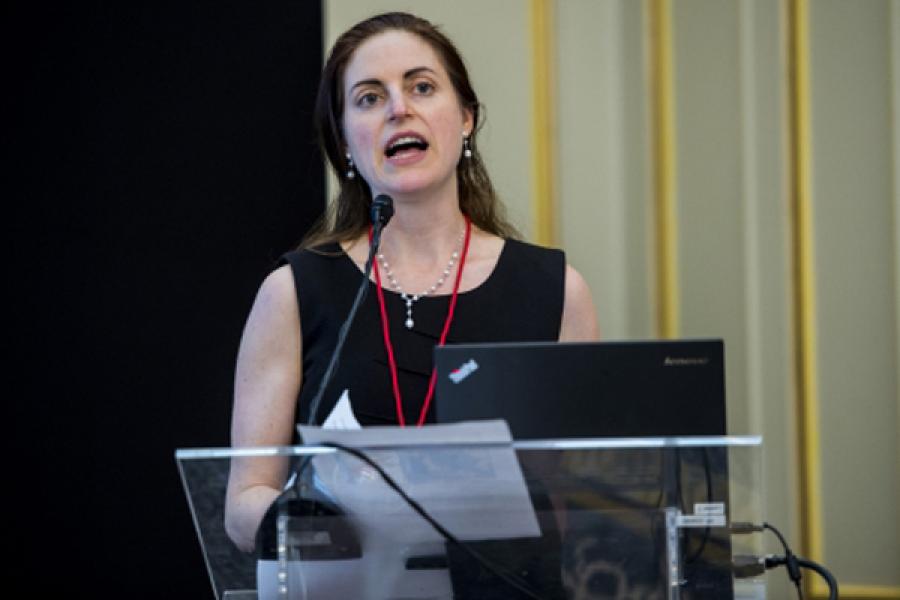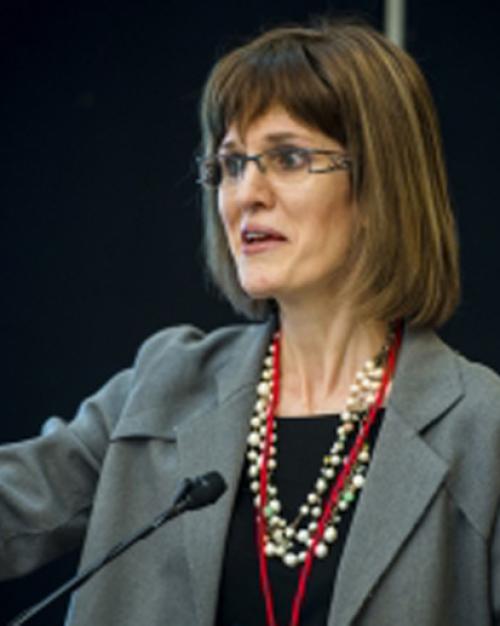As nations search for ways to reduce their greenhouse gas emissions, the long-simmering debate over nuclear power has heated up. Nuclear advocates, opponents and governments argue over nearly every aspect of the technology, from the cost of construction to the challenge of waste storage to the industry’s relationship with nuclear weapons programs.
But there has been inadequate discussion of how to compensate victims of nuclear accidents, said Cornell law and anthropology professor Annelise Riles at an expert briefing in Brussels on May 19.
“Whatever your view of nuclear power is, whatever your view of what the future should be, there needs to be better conversation about how compensation is handled and what the true costs of nuclear power are,” she told high-level officials from the European Union and European Commission, as well as activists, scholars and industry representatives.
The briefing compared approaches to compensation for victims in Japan, the United States, the Soviet Union and successor states. It was organized by Cornell’s Mario Einaudi Center for International Studies and the Meridian 180 program, which Riles directs. The panelists were members of a multidisciplinary working group on nuclear energy that the two organizations created last year.
Rebecca Slayton, assistant professor of science and technology studies at Cornell and associate director of the Judith Reppy Institute for Peace and Conflict Studies, said it was safe to assume that there will be more nuclear accidents, no matter how diligently engineers, operators and regulators work to prevent them.
“We are calling for the creation of a transnational forum that enables laypersons, experts and policymakers to discuss nuclear disaster compensation plans before the next disaster occurs,” she said.
More than six years after a series of meltdowns at the Fukushima Daiichi nuclear power plant displaced more than 160,000 residents, the people of Japan still have no idea how much the disaster will cost, reported Takao Suami, professor of law at Waseda University in Tokyo.
Even if a number eventually emerges, he added, it will not reflect the full social, psychological and environmental toll of the accident.
“The Fukushima disaster has not ended,” Suami said. “Thousands of people are still forced to evacuate and cannot return to their homes. Highly contaminated cooling water is leaking into the Pacific Ocean every day.”
Presenting the U.S. case, Mary X. Mitchell, an attorney, historian and postdoctoral fellow at Cornell’s Atkinson Center for a Sustainable Future, described the official response to a partial meltdown and radiation leak at the Three Mile Island nuclear power plant in Pennsylvania in 1979.
U.S. policy from the 1950s was designed to encourage private investment in the peaceful use of nuclear technology, she explained. It did this in part by setting limits on the liability of plant operators and requiring them to carry private insurance.
As it happened, the Three Mile Island incident came nowhere near to challenging the liability caps, Mitchell said. But it did take more than 20 years to settle class-action lawsuits by area residents. And if the accident had been even half as severe as the one at Fukushima, it would have far exceeded the liability limits and required special action by the U.S. Congress.
“We should think of Three Mile Island as a dry run illustrating the legal difficulties and the duration of conflict,” Mitchell said.
Sonja Schmid, associate professor of science and technology studies at Virginia Tech, presented the case of Chernobyl, which suffered a massive meltdown in 1986 in what was then the Ukrainian Soviet Socialist Republic.
The accident required the evacuation of 135,000 people, contaminated vast areas of farmland and made entire communities uninhabitable. While some health effects were acute and immediate, others took years to emerge, often far from the disaster site.
In the absence of compensation guidelines, the Soviet government adapted policies for providing basic services and minimum income to war veterans, pregnant women and disabled people to those who qualified as “Chernobyl veterans.”
The situation was further complicated by the 1991 breakup of the Soviet Union, which divided the affected area among three different countries, each with its own approach to liability and compensation, and each with its own economic and political challenges.
Among the lessons from Chernobyl, Schmid said, is the importance of international agreements and protocols, as radiation does not respect national borders.
Slayton noted the failure of existing compensation schemes to meet the demonstrated needs of victims, and spoke of the importance of engaging the public in planning for future incidents in a way that is “anticipatory, participatory and transnational.”
Among those whose voices must be heard, she said, are potential victims of accidents and citizens of countries that have not yet decided whether to adopt nuclear energy.
This story also appeared in the Cornell Chronicle.





